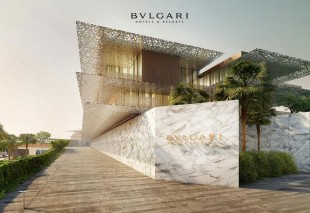

Bulgari Hotel Dubai developer Meraas 'mulling IPO'

Dubai’s Meraas Holding, the developer behind the Bulgari Hotel being built in Dubai, is considering launching an initial public offering, sources close to the company have claimed.
Three sources told the Wall Street Journal the Dubai government-backed real estate firm has sent requests for proposals to several banks looking for advice on how to boost the company’s capital, including the possibility of selling shares as part of an IPO.
“Meraas has a phenomenal land bank and the future holds a lot of potential for them,” said one of the bankers.
The developer is involved in a number of high profile projects, including a development project for a 1.8km stretch of Dubai Creek which will cost about US $544 million, the US $1.6 billion Bluewaters mixed use project along Jumeirah Beach Residence, which will include the world’s largest Ferris wheel and the Citywalk retail project in Jumeirah.
It also teamed up with Emaar Properties to develop Dubai Inn, a new economy hotel brand and has also partnered with Six Flags Entertainment Corporation, the world’s largest regional theme park company, to build an attraction in Dubai.
However, possibly its biggest project was the joint venture announced last year with Emaar to build a huge residential and commercial area near the city's downtown as part of the Mohammed Bin Rashid City project.
The two government-backed developers plan construction of a commercial centre, low- and mid-rise residences, an 18-hole golf course and other facilities over a 11 million square metre plot of land.
The announcement comes as it was revealed that Emaar is planning to float its malls business later this year.
“If it (Meraas IPO) happens, it will certainly be after the Emaar Malls IPO, which everybody will be looking at,” one of the sources was quoted as saying.
Meraas has not yet commented on the speculation.
Article continues on next page...
Earlier this month, Masood Al Awar, CEO of Tasweek Real Estate Development and Marketing, whose own firm is planning to launch an IPO later this year, said the rise of Dubai's fast-growing residential real estate market is likely to peak in 2015
“We do a lot of analytics and we do a lot of market research. We know that every eight or seven years there are some disturbance in the market and nothing can climb so rapidly,” Al Awar said.
“I think 2015 will be the peak but if we sustain it, [growth] can be prolonged to avoid the downturn… avoid the pitfall [of 2008],” he added.
While Property prices plummeted nearly 60% in the aftermath of the Dubai property crash in 2008 and 2009, Al Awar said such a dramatic drop was unlikely this time and growth was likely to plateau as the market was being managed in a more strategic way this time around.
“We have to make sure the pitfall is prohibited and we manage the cash flow and move forward. It is about sustainability and growth,” he said.
Al Awar’s comments echo those expressed in a report last month by property consultants JLL, which claimed that growth in the Dubai residential market is slowing as government steps to curb speculative buying have an impact and higher prices start to affect demand.
Second-quarter trends in the market suggest the risks of the Dubai property market overheating and then crashing, as it did in 2008-2009, are easing, Craig Plumb, JLL's head of research for the Middle East and North Africa, told Reuters.
"It's good news that the market is slowing down," Plumb said, adding that when the market eventually reached the falling phase of its cycle, the pull-back was unlikely to be as violent as it was five years ago, when it triggered a corporate debt crisis in the emirate.
For now, the residential market is still climbing rapidly; average sale prices jumped 36% from a year earlier in the second quarter, compared to 33% in the first. Rents gained 24%, after 23% in the previous quarter.
But on a quarter-on-quarter basis, rises are slowing. Sales prices grew 6% in the second quarter, down from 10% in the previous quarter, JLL calculated. The increase in rents dropped to 3% from 7%.